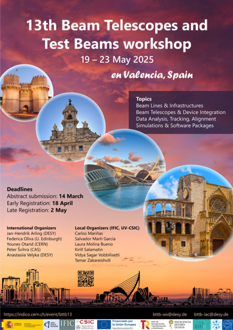Speaker
Description
Charged hadron particle identification (PID) is essential for a successful flavour physics experiment. The Ring-Imaging Cherenkov (RICH) system in LHCb has provided excellent performance to date, and maintaining this level of PID performance is central to the Upgrade II physics programme. The key challenge posed by the high-luminosity LHC is an increase in pile-up at LHCb to ~40 due to an instantaneous luminosity of $1.5 \times 10^{34} \ {\rm cm^{-2} \ s^{-1}}$, requiring improvements in both spatial and time resolution. In particular, new photon detector technology will be required as part of the LHCb Upgrade II—in Long Shutdown 4 (LS4)—while the development of the fast readout is being anticipated as part of the RICH LS3 Enhancement. During LS3 the entire RICH readout chain will be replaced and the current photon detectors, Multi-anode Photomultiplier Tubes (MAPMTs), will be read out by a custom ASIC, the FastRICH.
In this talk I will present preliminary results from a 2024 beam test campaign at the CERN SPS, with a prototype electronic chain consisting of the FastIC, picoTDC and lpGPT/VTRX+ optical link. The functionality of the FastIC and picoTDC ASICs will be combined in the recently submitted FastRICH; therefore it serves as a pathfinder for the LS3 programme. I will present timing analysis results for this electronic chain coupled to MAPMTs, showing compatibility with the expected transit-time-spread of 150ps. These beam test measurements are validated through laboratory studies with a picosecond pulsed laser setup, in which scans of the operational thresholds of the FastIC characterise the response of the opto-electronic chain to photon signals.
This work provides deep insight into novel fast-timing techniques through detailed demonstration of a prototype RICH detector module with O(100 ps) time resolution, offering key input for upgrades to the LHCb experiment.
